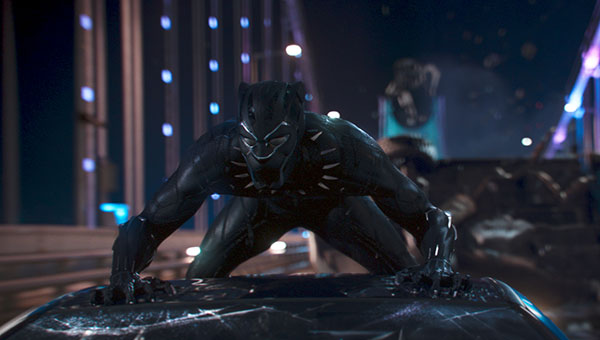Black Panther Review

I’m a white, thirty-something man.
I already knew this, but it’s fair to say I didn’t quite realise what this meant until I attended the european premiere of Marvel’s latest comic book yarn Black Panther.
And I probably still don’t.
As with most superhero origin stories, Black Panther begins with the death of our protagonist’s father.
Apparently, a man isn’t a man until his father dies… thanks for that Stan Lee.
This isn’t really a spoiler though, as T’Challa’s father T’chaka died in a previous Avengers film – with director Ryan Coogler’s stand alone movie filling in the blanks between then and now.
With his father gone, T’Challa is now heir to the throne of Wakanda – a technological wonder lying under a cover of misdirection in the heart of Africa.
Our Challa is also in line to be the next Black Panther, sort of an African Iron Man for the uninitiated – like me – who know jack about comic books, who uses his homeland’s superior technology to help maintain law and order to the peaceful climes of Wakanda.
T’Challa isn’t the only one who wants to rule over Wakanda though, and when a mysterious stranger challenges our hero to combat, it’s not only the future of Black Panther that’s at stake, but also his past.
Directed and co-written by Coogler, the man behind Creed and the heartbreaking Fruitvale Station, Black Panther is the latest superhero off the never-ending Marvel production line.
This one is a little bit different though, as its inspiration lies in African and African-american culture.
Which probably shouldn’t be a groundbreaking idea in 2018, but it’s hard to escape the conclusion that it is.
In a lot of ways, Black Panther is no different from any other Marvel superhero film.
It looks and sounds spectacular, but the formulaic three act arc won’t surprise anyone with a pulse and you’ll see most plot twists coming long before they arrive.
In other words, just like any other superhero film.
What sets Black Panther apart is its source material, which pits traditional African culture against the more modern incarnation created by African Americans.
Most importantly of all, this story is told by people from these cultures – both in front of and behind the camera
Before watching Black Panther, I wouldn’t have given much thought to the significance of this.
Having seen it in a crowd where I was the minority, I’m in no doubt about the importance of owning your own stories – even if they’re fictitious.
Of course, this alone isn’t enough – so it’s a good thing Coogler has come up with a very watchable movie too.
Chadwick Boseman reprises his role as the Black Panther, Lupita Nyongo’o plays his secret agent love interest and regular Coogler muse Michael B Jordan gets to go bad as the ridiculously monikered – and coiffed – antagonist Erik Killmonger.
Acting aristocracy Forest Whitaker and Angela Bassett make up the on screen royalty, middle earth alumni Martin Freeman and Andy Serkis provide some laughs and Letitia Wright as T’Challa’s little sister Shuri steals the show as a sort of ‘Q’ type character for her crime fighting brother.
There are more than a few echoes of James Bond, with one scene looking like it was lifted straight out of Skyfall, as well as a tribal nod to The Lion King, which makes Black Panther a little too derivative to be a great film for me.
But then Black Panther wasn’t made for me, and that’s kind of the point.
Pretty much every superhero film ever made has had an audience who looks a lot like me in mind when it was being produced, but the times they are a-changing.
Coming hot on the heels of last summer’s smash hit Wonder Woman, hopefully this increasing diversity at studio level is a reflection of our own societies’ evolving inclusivity.
Because sometimes, a good superhero film can be even greater than a great one.
Jonathan Campbell